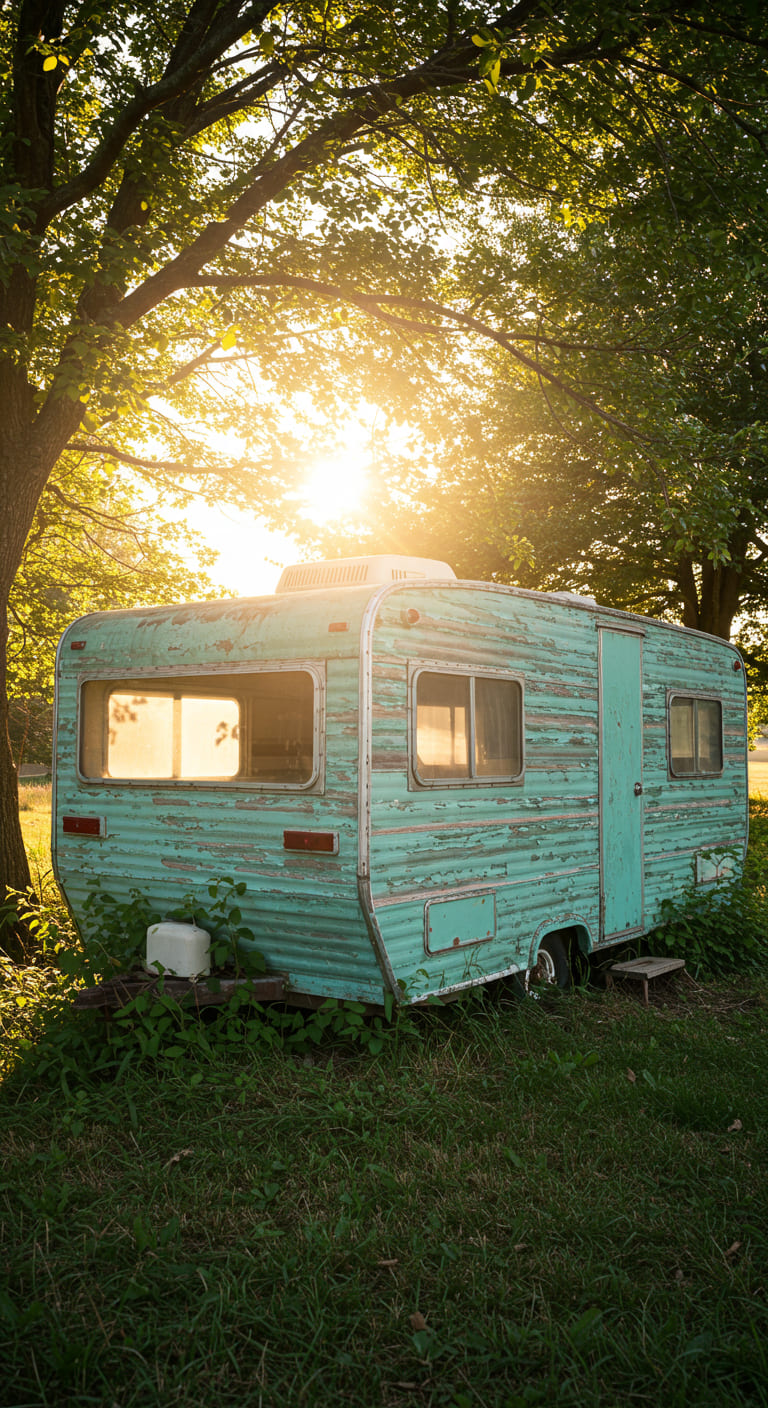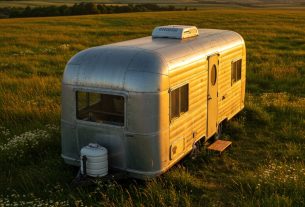As I sit down to delve into the fascinating world of mobile homes, I’m struck by how these unique dwellings have evolved over the decades. When I first encountered the term “mobile home,” I imagined something small and basic, perhaps a relic of a bygone era. However, as I explored their history and purpose, I discovered that mobile homes represent far more than simple shelter. In this article, I aim to unravel the history behind the invention of mobile homes, their significance, and how they continue to offer innovative solutions in today’s housing landscape.
The Birth of Mobile Homes
The concept of mobile living can be traced back to the early 20th century. Initially, the idea was not to create homes that could be easily transported but rather to provide affordable housing solutions in a rapidly industrializing world. The first mobile homes, or “trailer homes” as they were often called, emerged in the 1920s. These early models were essentially modified trailers that could be towed by automobiles. They represented a new lifestyle that appealed to a growing population seeking mobility and freedom.
Early Innovations
During the 1920s and 1930s, the automobile industry flourished, and with it, the idea of living on the go gained traction. The Great Depression further fueled the mobile home market as families sought affordable housing options. Companies began producing lightweight, towable structures that could serve as both homes and vacation getaways. The 1930s saw an increase in demand for these mobile units, particularly among those who needed to relocate for work or to seek better economic opportunities.
- 1930s: The rise of the Great Depression led to the creation of affordable mobile homes, providing families with a solution to housing shortages.
- 1940s: World War II saw a demand for temporary housing near military installations, further popularizing mobile homes.
- Post-War Boom: After the war, returning veterans sought affordable housing, leading to a surge in mobile home production.
The Evolution of Mobile Homes
As I continued my research, I found that the evolution of mobile homes closely mirrored societal changes. The post-World War II era marked a transformative period in American history. Soldiers returning from war needed housing, and mobile homes became a practical solution for many families. The government even supported the construction of mobile home parks to accommodate the influx of returning veterans.
Technological Advancements
The 1950s and 1960s brought technological advancements that greatly improved the quality and comfort of mobile homes. Manufacturers began using new materials and construction techniques, leading to more durable and aesthetically pleasing structures. As a result, mobile homes began to shed their stigma as mere temporary housing. They evolved into spaces that offered comfort, style, and a sense of community.
Key Innovations
- Introduction of better insulation and heating systems.
- Improved plumbing and electrical systems.
- Modern design elements and customizable options.
Understanding the Appeal of Mobile Homes
As I pondered the reasons behind the enduring appeal of mobile homes, several key factors came to mind. They represent a lifestyle choice that prioritizes flexibility, affordability, and simplicity. For many, mobile homes offer a pathway to homeownership that may otherwise be unattainable in today’s housing market.
Affordability
One of the most compelling reasons for the invention and continued popularity of mobile homes is their affordability. According to the U.S. Census Bureau, the average cost of a newly constructed single-family home has skyrocketed in recent years. In contrast, mobile homes continue to provide a cost-effective alternative. With prices significantly lower than traditional homes, mobile homes allow individuals and families to invest in their own space without breaking the bank.
Flexibility and Mobility
Another appealing aspect of mobile homes is their inherent flexibility. The ability to relocate without the hassle of selling a traditional home is a significant advantage for many. This is particularly important for those who may need to move for work or personal reasons. The opportunity to live in different locations while maintaining a sense of home is a unique benefit that mobile homes provide.
The Modern Mobile Home: A New Era
Today, mobile homes have undergone a renaissance. The modern-day manufactured home is a far cry from the early models of the 20th century. With advancements in design, technology, and sustainability, they are now seen as viable housing options rather than mere temporary solutions.
Innovative Design
Modern mobile homes are designed with aesthetics and functionality in mind. Many manufacturers offer customizable options, allowing homeowners to choose layouts, finishes, and features that suit their needs. The rise of eco-friendly materials and energy-efficient designs has also contributed to the appeal of mobile homes, attracting environmentally conscious buyers.
Examples of Modern Mobile Home Designs
- Open Floor Plans: Many new models feature spacious, open layouts that maximize living space.
- Sustainable Features: Solar panels, energy-efficient appliances, and sustainable materials are becoming standard.
- Smart Home Technology: Integration of smart technology for security, energy management, and convenience.
Challenges and Misconceptions
Despite their many advantages, mobile homes still face challenges and misconceptions. It’s essential to address these issues to foster a more accurate understanding of what mobile homes can offer.
Stigma and Stereotypes
Historically, mobile homes have been associated with negative stereotypes and a stigma of being low-income or inferior housing. This perception is slowly changing, but it still lingers for many. To combat this, advocates and manufacturers are working to showcase the quality and diversity of modern mobile homes.
Regulatory Challenges
Another significant challenge facing mobile home owners is navigating the legal and regulatory landscape. Zoning laws and restrictions can limit where mobile homes can be placed, making it difficult for prospective buyers to find suitable land. Additionally, securing financing for mobile homes can be more complicated than for traditional homes.
Case Studies: Success Stories
As I explored further, I came across inspiring case studies that highlight the positive impact of mobile homes on individuals and communities. These stories demonstrate how mobile homes have changed lives, providing affordable and adaptable housing solutions.
Community Development Initiatives
In various regions across the United States, community development initiatives have focused on integrating mobile homes into existing neighborhoods. These projects aim to create inclusive communities that provide affordable housing options for all. For instance, in New Mexico, a project called “Tiny Homes for Veterans” has successfully built mobile homes for homeless veterans, offering them a stable and supportive living environment.
Statistics Supporting Community Initiatives
- According to the U.S. Department of Housing and Urban Development, mobile homes represent approximately 6% of the total housing stock in the United States.
- Research indicates that mobile homes can significantly reduce housing costs, making them an attractive option for low-income families.
Join the Conversation!
As we continue to navigate the complexities of housing in the 21st century, the conversation surrounding mobile homes is more relevant than ever. Whether you are a homeowner, a prospective buyer, or simply someone interested in alternative housing solutions, your voice matters. I encourage you to share your thoughts, experiences, and insights about mobile homes.
Get Involved
Join forums, attend community meetings, and engage in discussions on social media platforms. By sharing your story, you contribute to breaking down the misconceptions surrounding mobile homes and foster a better understanding of their benefits. Together, we can reshape the narrative and highlight the valuable role mobile homes play in providing affordable housing options.
Conclusion
In conclusion, the history of mobile homes is rich and multifaceted. From their origins as basic trailers to their evolution into modern, stylish dwellings, they have played a vital role in addressing housing challenges throughout history. The affordability, flexibility, and innovative designs of mobile homes make them a compelling choice for many individuals and families today.
As we move forward, it’s essential to continue the conversation about mobile homes and their place in our communities. By sharing our knowledge and experiences, we can promote awareness and understanding of these unique living spaces. If you found this article insightful, I encourage you to sign up for our newsletter for more updates and share it with your friends and on social media. Let’s keep the dialogue going!
FAQ
What is the difference between a mobile home and a manufactured home?
A mobile home is typically a home built before the HUD code was established in 1976. Manufactured homes are built to meet the HUD code and are often considered more modern in design and construction.
Are mobile homes a good investment?
Mobile homes can be a good investment, particularly for those seeking affordable housing options. However, it’s essential to research local zoning laws and market conditions before making a purchase.
Can mobile homes appreciate in value?
While mobile homes generally depreciate in value like vehicles, certain models and locations can experience appreciation, especially if they are well-maintained and located in desirable areas.
Wireless Trailer Lights Magnetic, upgrade Rechargeable Wireless Trailer Tow Lights LED Kit, IP65 Waterproof, 10-Hour Battery Life, 100 FT Signal Synchronization for Towing Truck Camper RV Boat
$51.99 (as of October 8, 2025 06:39 GMT -03:00 - More infoProduct prices and availability are accurate as of the date/time indicated and are subject to change. Any price and availability information displayed on [relevant Amazon Site(s), as applicable] at the time of purchase will apply to the purchase of this product.)
Sign up for our newsletter and stay up to date with exclusive news
that can transform your routine!





